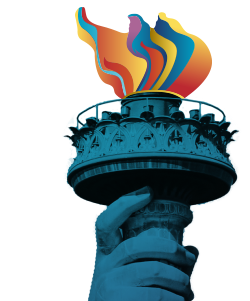J. Patrice Marandel was born and raised in Paris. He recalls that growing up, “My family never lacked food. I do not remember ever being hungry, but I remember stretching supplies because they were hard to come by.… I remember shortages of flour and butter and just about everything else, and of electricity that plunged our family dinners into terrifying darkness.” He graduated from the Institut d’art et d’archéologie, Sorbonne Université in Paris, arriving in the United States in 1967 for a summer internship at the Philadelphia Museum of Art. He returned to the U.S. in 1969 with a grant from the French government as a Focillon Fellow at Yale University. In a 2023 interview with the French edition of the Art Newspaper, he looked back on his early years in the States: “America was living through a turbulent period that attracted me.… Jean Genet and the Black Panthers were present and were ‘challenging’ the established order. It was an exciting, if sometimes violent, moment in American history, and I have never regretted having witnessed it.”
Eventually, Marandel settled in New York, working for two years as a researcher for the Menil Foundation before being named chief curator of the museum at the Rhode Island School of Design. He then moved on to curatorial posts at a succession of major American museums, including the Art Institute of Chicago; the Museum of Fine Arts, Houston; and the Detroit Institute of Arts, where he spent 13 years as curator of European art. His successful career as a researcher and curator was capped with his distinguished 19-year tenure as chief curator of European painting and sculpture at the Los Angeles County Museum of Art (LACMA), from which he retired in 2017. “When I arrived,” he recollects, “LACMA was a museum in the making. All that was needed was to restructure the collection, to decide on lines of development, to rethink the meaning of the collection as a whole.” Today, thanks in large part to Marandel’s ambitious efforts, LACMA is widely acknowledged as one of the foremost art museums in the world.







